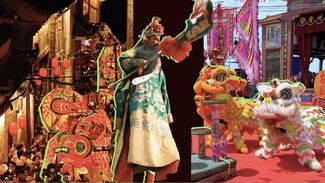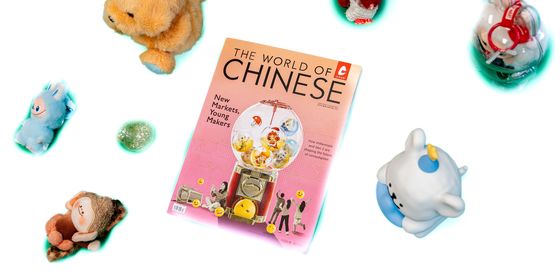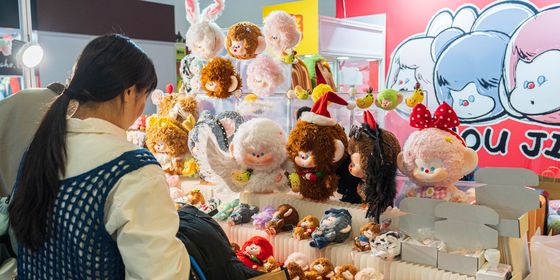With recent crackdowns on foreign students in the US, the prospect of studying abroad is becoming increasingly fraught for Chinese students—but they are no strangers to uncertainty away from home, as these phrases show
On May 27, the US halted the scheduling of new visa interviews for international students seeking to study in the country, reportedly to expand screenings of their social media activity. This latest policy change has thrown yet another wrench into the already uncertain journey of international students as they transition into adulthood, with many—just around 20 years old—still navigating culture shock, language barriers, and academic pressure.
Since the late 19th century, Chinese students have pursued overseas studies, mainly in the US, Europe, and Japan. Many influential political leaders, scholars, and cultural figures studied abroad, shaping the course of modern Chinese history. In contemporary China, major waves of overseas study, particularly in the 1980s and 1990s, have made studying abroad a coveted path for the elite, adding prestige to the term 留学生 (liúxuéshēng, overseas student).
The trend surged with China’s rapid economic growth in the 2000s and continues today. Despite a dip during the pandemic, China remains one of the largest sources of international students globally.
Read more about Chinese students abroad, past and present:
- Meet the Mature Chinese Students Ditching Deadend Jobs to Study Abroad
- Abroad Ambitions: Are Study Abroad Agencies Really Necessary?
- Two-Way Communication: How China Adopted Japanese Terms to Discuss Modernity
Today, studying abroad is no longer a rarity, and social media has exposed both the glamour and the grit of overseas life to a wider audience. Many Chinese students playfully refer to themselves as 留子 (liúzi)—a casual, colloquial spin on the formal term. Always on the move and full of surprises, they continue to create viral memes inspired by the twists and turns of their lives abroad.
Studying is a liuzi’s main focus. Papers, quizzes, essays, group projects, midterms, presentations, and finals come one after another without pause, chasing these hopeful students into a constant cycle:
Either rushing to meet a due [date], or on their way to rushing one.
不是在赶due,就是在赶due的路上。
When the Chinese embassy in Britain issued a notice in May about a rise in requests for help related to telecom fraud and brief lapses in contact with international students, it turned out that many of the students had missed calls from family members because they were busy working on papers at night and sleeping during the day.
The road to graduation is undeniably tough, leaving liuzi little choice but to keep their heads down and study hard. German universities are especially notorious for the rigor of their three-year undergraduate programs, inspiring a widely shared student “comfort phrase” that perfectly captures the seemingly endless student experience:
Those three years studying in Germany will stretch into five, becoming the most unforgettable seven years of your life.
在德国留学这三年,会是你五年人生中,最难忘的七年。
Besides academic pressure, moving to a foreign country to start a new life is never easy. For many international students, life begins in a bare rental space with absolutely nothing inside, leading to the meme of 经典开局 (jīngdiǎn kāijú, or “classic opening”) that resurfaces at the start of each academic year as newcomers share photos of makeshift beds—blankets or even piles of clothes laid out on the apartment floor.
Given the relatively high living expenses abroad, many liuzi turn to secondhand goods passed down from their predecessors for a more economical start. From hangers to mattresses, desks to fridges, each item has its own mysterious provenance, leading students to muse:
A liuzi’s home is built on the collective efforts of countless other liuzi.
每一个留子的家都是靠无数留子托举起来的。
Once a rice cooker goes abroad, it basically gains permanent residency.
当一个电饭锅出了国,它就会在当地获得永居。
In this world of secondhand trading, it’s not the most expensive items that are the most coveted. So while a 2,000-yuan secondhand Louis Vuitton bag might struggle to find a buyer, certain household items get snapped up in seconds.
Real luxuries in the eyes of liuzi: mahjong sets, hot pot seasoning, collapsible bathtubs, and spicy snacks like latiao.
留子眼中真正的奢侈品:麻将、火锅调料、折叠泡澡桶、辣条。
Food is another major struggle for liuzi. Faced with bland, repetitive meals, salads, sandwiches, and fries, many jokingly refer to them as “white people food (白人饭 báirénfàn).” As one desperate liuzi once bemoaned online:
Is this studying abroad or exile?
这是留学还是流放?
So they start cooking to survive, or at least to add a little variety. But with limited cooking skills, many can only manage so-called “survival meals (生命体征维持餐 shēngmìng tǐzhēng wéichícān).” To make things worse, when they do exist, Chinese supermarkets are often located far outside of city centers, so most liuzi stock up on enough supplies to last them a few weeks. Under such conditions, the refrigerator has started to become known as: “A time-freezing device (时间停止器 shíjiān tíngzhǐqì).”
Under posts on social media asking if expired food is still edible, the top comment is almost always:
Are you a liuzi? If you are, then yes—you can eat it.
你是留子吗?是留子就能吃。
Living abroad long enough, liuzi often joke, will turn anyone into a great cook. As the saying goes:
One liuzi goes abroad, one chef comes back.
出去一个留子,回来一个厨子。
Daily life presents many other hurdles as well. With healthcare abroad, especially in the US, often painfully expensive, getting timely and proper medical treatment can feel like a luxury. It’s no wonder liuzi often joke:
When you’re overseas, surviving an illness depends entirely on your will to live.
在外看病,全靠命硬。
However, in the early days of studying abroad, liuzi often found that bland food was the least of their worries—navigating the language barrier proved even tougher. Although many had passed their academic requirements, most had little opportunity to practice real, everyday English before heading overseas.
As a result, many relied on their “broken English (散装英语 sǎnzhuāng Yīngyǔ),” which sometimes led to awkward and funny situations. One student recalled that when they had just started university, during a group discussion, the professor came over and asked how things were going. The student accidentally blurted out, “We are still disgusting.”
But once they are fully immersed in an English-speaking environment, many return home only to find their Chinese has slipped—often replaced by what they jokingly call “glitched Chinese (乱码中文 luànmǎ Zhōngwén).” One netizen shared that they accidentally referred to cash (现金 xiànjīn) as 纸钱 (zhǐqián), or funeral money.
For many international students, tough times are part of the journey—overwhelming coursework, unexpected health issues, money troubles, or the loneliness of being far from home. These struggles have sparked a meme known as “an international student’s darkest hour,” or 留学生的至暗时刻 (liúxuéshēng de zhì’àn shíkè), where students post everything from heartbreaking academic setbacks to the panic of job hunting with graduation just around the corner.
After navigating all kinds of bizarre situations, every international student somehow develops that signature “liuzi vibe (留子味 liúzi wèi).” Some call it a kind of effortless “composure (松弛感 sōngchígǎn),” but only they know it’s really a “composed madness (平静的疯感 píngjìng de fēnggǎn)”—the result of being toughened up for whatever life throws their way, as they like to proclaim:
Even if Mount Tai were to collapse in front of me, I’d still nap and make myself a meal first.
泰山崩于前,我也能先睡个觉做个饭。
Because they know, when you’re abroad, bad luck comes too easily, and panicking never helps—as long as they survive, that’s good enough.












